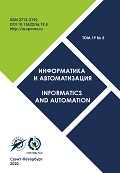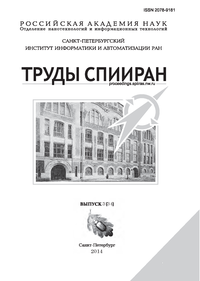Повышение эффективности управления в условиях изменения психофизиологического состояния персонала
Ключевые слова:
эффективность, управление персоналом, психофизиологическое состояние, автоматизированное рабочее место, джиттерАннотация
Представлен подход к совершенствованию научно-методического аппарата определения психофизиологического состояния операторов по информации от многомодального входного интерфейса автоматизированных рабочих мест. В качестве уникальной поведенческой характеристики человека, отражающей его психофизиологическое состояние, предложено использовать джиттер периода основного тона речевого сигнала, длительности и периода нажатия кнопок на клавиатуре, длительности и периода нажатия левой клавиши «мыши», а также сигнала ее перемещения. Показана возможность объединения частных оценок психофизиологического состояния оператора, определяемых как доля кадров анализируемого сигнала, на которых абсолютное значение случайного джиттера превышает пороговое значение, на основе обобщенной функции Харрингтона. в условиях изменения ПФС операторов, оцененного на основе разработанного инструментария, является адекватным задаче управления персоналом. Продемонстрирован пример повышения эффективности оптимизации закрепления производственно-технологических функций за операторами на 1,6-6,8% по сравнению с известным решением и возможность автоматизации процесса управления персоналом газодобывающих и газотранспортных предприятий.







